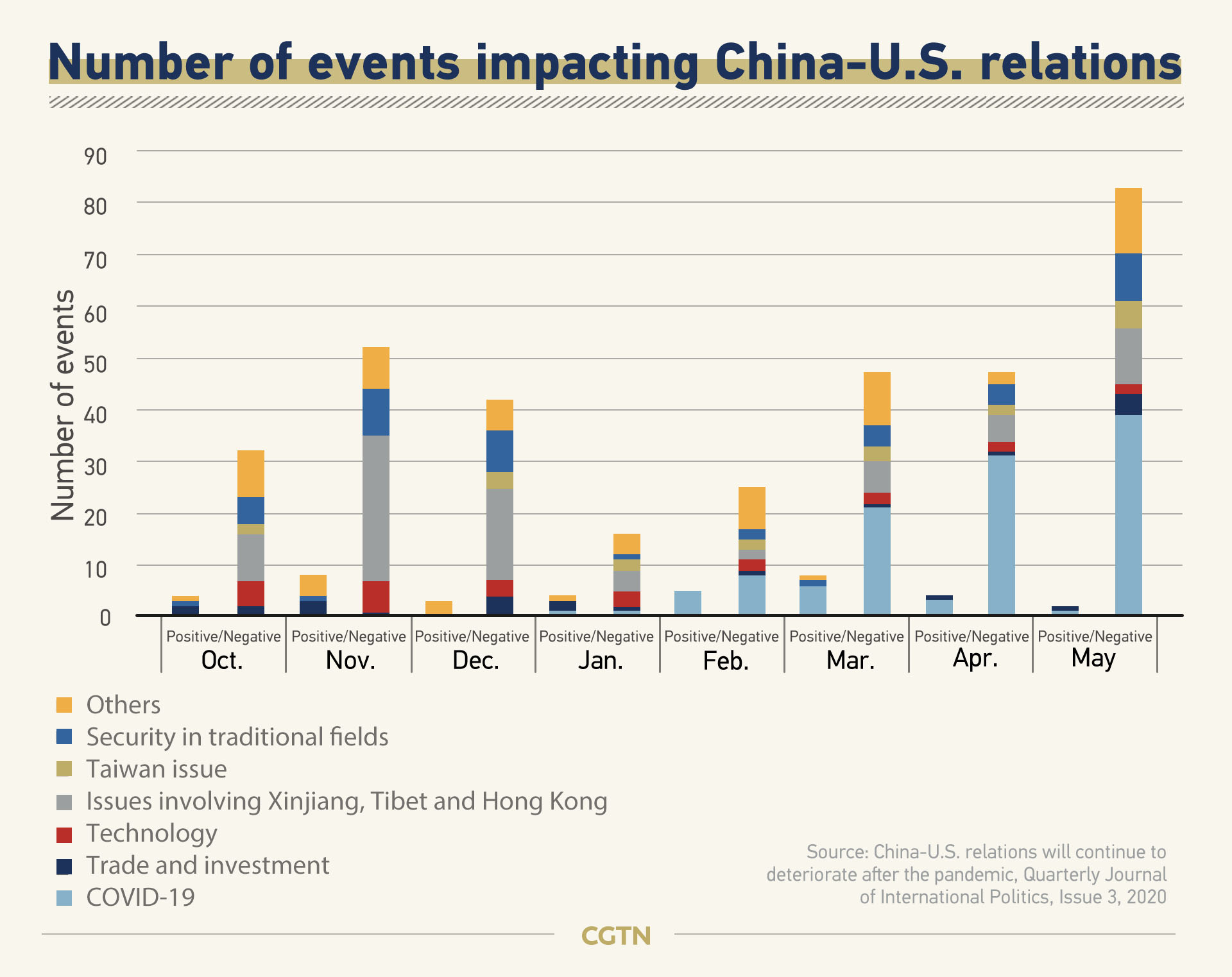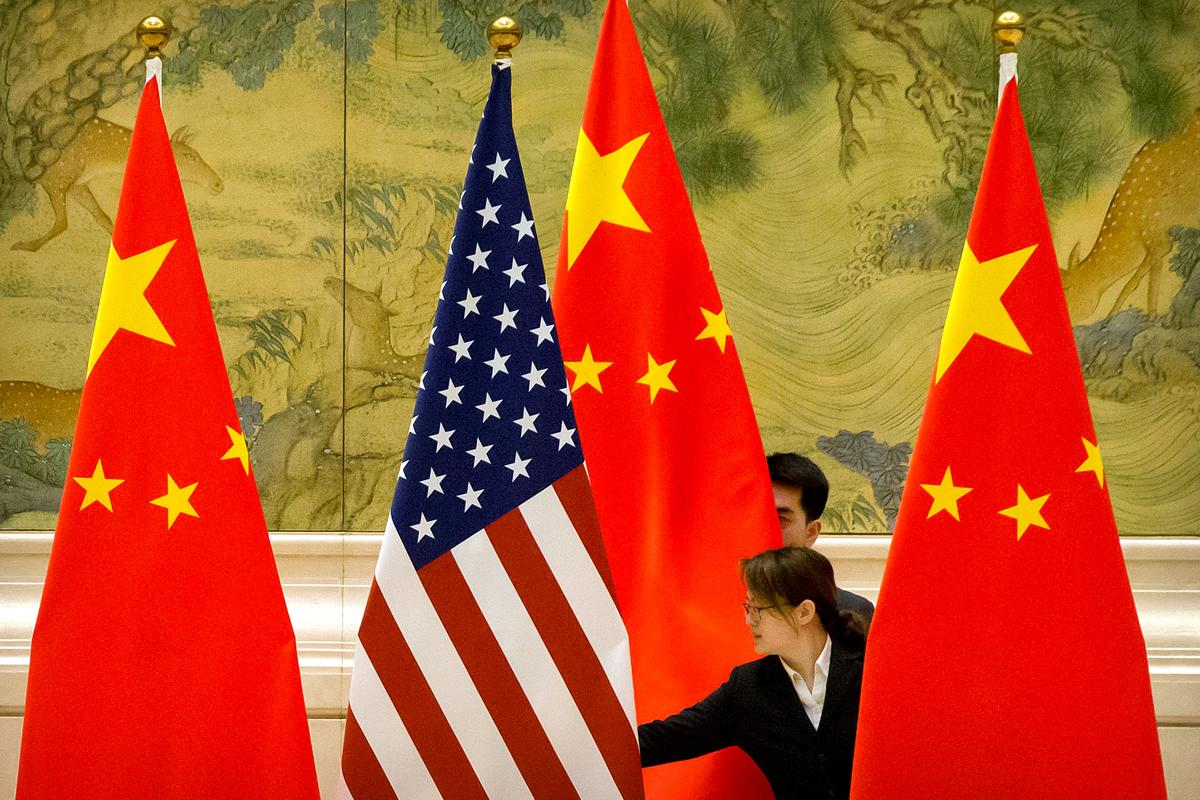Relations between China and the United States hit a nadir this week, with Washington intensifying its attacks by ordering the Chinese consulate in Houston to close and Beijing responding by instructing the U.S. consulate in Chengdu to shut its doors.
Following months of sanctions, counter-sanctions and a diplomatic war of words, Chinese Foreign Minister Wang Yi said bilateral ties are at their lowest point in 40 years. U.S. Secretary of State Mike Pompeo escalated criticism of China in a speech on Thursday, indicating a stabilization of relations is not on the White House's agenda.
As the two sides consider the next steps, CGTN spoke with three experts on four key issues in China-U.S. relations.
Read more:
Open letter from Chinese Consul General on Houston consulate closure
Explainer: What Houston consulate closure means for China-U.S. ties
Why the Houston closure is an opportunistic stunt
What does Houston consulate closure mean for bilateral ties?
The Chinese consulate general in Houston, Texas was the first established by China in the United States. Experts believe closing it has a significant symbolic impact.
Closing the consulate is a major diplomatic incident, Sun Taiyi, assistant professor of Political Science at Christopher Newport University, said, adding that the escalation by Washington could be the last straw in the sharp decline of China-U.S. ties.
He linked the timing of the decision to two key events in the U.S. this week.
On Tuesday the U.S. indicted two alleged Chinese hackers on charges of targeting COVID-19 vaccine research. Sun believes there is a connection between this and the U.S. State Department's explanation as to why it ordered the consulate's closure.
Meanwhile, the total number of COVID-19 cases reported in the U.S. passed four million on Thursday and the death toll surpassed 140,000 this week. To avoid those numbers dominating the news cycle, the administration created a distraction, Sun speculated, adding "it is consistent with Donald Trump's style of manipulating the media."
Ye Hailin, director of the Center for South Asia Studies at Beijing's Chinese Academy of Social Sciences, cautioned that a further deterioration in relations could follow.
He said the U.S. decision to close the Chinese consulate has harmed China-U.S. ties, offended China's national dignity and violated internationally recognized norms of diplomatic relations. "Ties have not reached a freezing point and can get worse in the following months," Ye added.

The Chinese Consulate-General in Houston, Texas, the U.S., July 22, 2020. /Reuters
The Chinese Consulate-General in Houston, Texas, the U.S., July 22, 2020. /Reuters
Why focus on China amid a worsening domestic situation?
The COVID-19 pandemic is careening out of control in the United States. It took 98 days to reach one million cases, but just 16 days to go from three million to four million.
The country's economy has stalled during the outbreak, leading to the fastest recession in U.S. history with the unemployment rate reaching 13.3 percent in May. And a vocal movement for racial justice has spread from coast to coast.
But faced by three simultaneous domestic crises, the only consistent line followed by the Trump administration has been to escalate attacks on China.
Those familiar with how Trump governs know that it is difficult to use "rational choice" to explain his behavior, Sun said. But he contended the U.S. approach is likely to be closely related to the domestic pressure the president is under.
Trump has sought to shift focus to China, Sun said, a tactic in line with a Republican campaign memo exposed in April. The 57-page memo suggests the party should pivot and attack China when asked tough questions about domestic failings.
Wang Yong, a professor at the School of International Studies under Peking University, observes the politicalization of the pandemic inside the U.S. has contributed to the administration's attacks on China.
But from Ye's perspective, U.S. efforts to contain China would have taken place with or without the pandemic. "It's more about to what extent and how firm the U.S. is," he said, adding the U.S. aims to suppress China to sustain its own hegemonic status.

What are the root causes of China-U.S. tensions?
Reports emerged last week suggesting that the Trump administration is considering banning Communist Party of China members and their families from traveling to the U.S., just the latest in a series of hardline moves floated by the White House.
Analysts said as the U.S. election looms, Trump's rhetoric and policies towards China are likely to harden and the closure of the Chinese consulate is a step in that direction.
The U.S. now sees China as its opponent, Ye said, adding that China-U.S. relations are trending in the same direction as Soviet-U.S. ties after 1964. "It's not rooted by ideological conflicts, but more related to conflicts of interests between two countries," he added.
Although both Trump and anti-China hawks in the U.S. share a desire to contain China's development, Wang believes their targets are different.
"For Trump, it's more about the election. And those security hawks in the U.S. utilize Trump's political concerns to promote their hard policies towards China and pursue a complete decoupling between China and the U.S.," he held.
"Those security hawks wanted to launch a new Cold War against China as with the (former) Soviet Union but I don't believe they will succeed."
Sun also noted with the election looming, China-containment policies previously resisted by Trump are increasingly being accepted.
"Trump's main rival Joe Biden has accused Trump of being softer on China," Sun said. "Conservative media criticized Trump for saying things and never acting when dealing with China." In this context, he added, the president was under pressure to act.

Before the opening session of trade negotiations between U.S. and Chinese trade representatives at Diaoyutai State Guesthouse in Beijing, China, February 14, 2019. /Reuters
Before the opening session of trade negotiations between U.S. and Chinese trade representatives at Diaoyutai State Guesthouse in Beijing, China, February 14, 2019. /Reuters
Will bilateral relations worsen or improve?
Since China and the United States established diplomatic ties in 1979, the two countries have witnessed twists and turns in their relationship.
Professor Wang remains optimistic about the prospects for bilateral relations in the long term but warns there are many variables ahead. He regards the coming election as a potential turning point.
Before the November 3 polling day, other confrontations could develop as anti-China hardliners step up their attacks, Sun said. "The situation may get worse and military conflicts in the South China Sea or Taiwan Strait are likely," he cautioned.
However, Sun added that the U.S. is not monolithic and there are voices in the country which can positively influence bilateral ties. "There are rational voices represented by the Democratic Party, which calls for political and economic reform at home and practical cooperation in the international field," he added.
Wang said that given China is not interested in the competition of ideologies and does not want to replace the U.S, it can positively influence bilateral ties over time.
But he warned if the U.S. continues to undermine the political conditions for the implementation of the phase one trade deal struck in January, negativity will continue to be cast over the relationship.
Sun said the key question now is how the countries act with 100 days left before the U.S. election. Just as the U.S. closed the Russian consulate in San Francisco and followed up with further measures, he said, closing the Houston consulate may be just the latest step in a pre-election escalation by the White House.
Ye said China should give up the illusion that U.S. would accept China's rise. "The U.S. won't allow two great powers in the world."